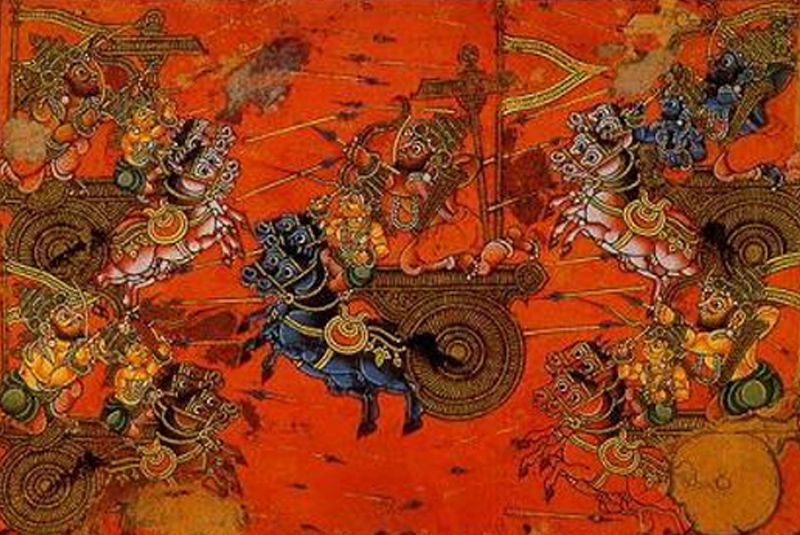Mausala Parva, a short chapter in the epic Mahabharata comprising about 200 verses, graphically depicts the obliteration of the mighty Yadava clan. A stray arrow kills Krishna, their illustrious leader, and Balarama, Krishna’s brother, dies by drowning, and his people engage in a civil war and ruin themselves through drunkenness, immorality and revelry.
Monstrous waves claim their majestic empire, and Dvaraka, their capital, is submerged under the sea. The once invincible warrior Arjuna, the story goes, is overwhelmed by Abhiras, the dacoits. The Abhiras loot his possessions and incapacitate his celestial weapons, and the mercurial war hero remains a hapless spectator when Krishna’s wives – whose custodianship he assumed – are abducted.
Disillusioned and disheartened by infighting within the Yadava clan, Yudhistira, the king, abdicates his throne and renounces the kingdom. He, together with his Pandava brothers and their polyandrous wife Draupadi, embark on a long, arduous walk towards heaven, carrying the flames of hell-fires within them.
Relativistic definitions of success and its semantic deliberation are one of the defining themes of the epic Mahabharata. On the nineteenth day of the war, rivers of blood and rotting corpses fill the playgrounds of Kurukshetra. Deathly silence engulfs the capital city of Hastinapura, once a vibrant citadel of joie de vivre, pulsating with life, prosperity, peace and promise.
A war fought over 18 days, supposedly by 4 million intrepid fighters, suffered extermination en toto. Amidst the sea of death and destruction, amidst the deafening cries of grief and eulogies, only twelve people remain. The survivors were seven Pandavas, Krishna and Satyaki, from the Pandava side, three from the Kaurava side – Aswathama, Kripa and Krithavarma – Yuyutsu, who was a half-brother of Kauravas but loyal to Pandavas and Vrishaketu, son of Karna.
In a war fought by 4 million people – to restore honour and justice, to seek vendetta against kith and kin – 7 men remaining on one side were deemed victorious against 3 on the losing side. Who is the victor and the vanquished here? Who won the war? Who lost? In the annals of human history, pyrrhic victories at the cost of collateral damage were always self-defeating and will always be.
Kunti, the matriarch, stumbles into the carnage and locates her eldest son, Yudhishtira, and with teary eyes and quivering lips, asks him to perform obsequies for Karna. The shell-shocked Yudhishtira learns, to his utter devastation, that he had killed his own brother, and this monumental victory hangs over the corpse of his own blood in the irreconcilable guilt of fratricide.
When family ties are severed, when siblings deceive themselves, when they reach for their throats, and when bloodshed ensues, who are the winners and losers?
In the tale of Mahabharata, two people could have thwarted the war but perilously sought it – Kunti and Draupadi. Kunti condoned war for justice, while Draupadi required it for revenge. If Yudhistira had gambled and pawned himself before Draupadi, what right did he have, as an enslaved person who lost the game, to pawn Draupadi?
A distraught Draupadi – lost in a ‘Nora Moment’ of monologue reflection akin to Henrik Ibsen’s ‘A Doll’s House – laments the plight of women in male-dominated patriarchal societies. Her despondent ruminations ruefully resonate with most Indian women, even in the twenty-first century.
The tale of Mahabharata is a compelling treatise on the dangerous consequences of greed, autocracy, vengeance and pride. The clarion call of Mahabharata is the restoration of justice and righteousness at large, immortalized through Krishna’s discourse in the Bhagavad Gita;
Paritranaya sadhunam
vinasaya ca duskrtam
dharma-samsthapanarthaya
sambhavami yuge yuge
Loosely, it translates to:
For uplifting of the good and virtuous,
For the destruction of evil,
For the re-establishment of the natural law,
I will come, in every age…
However, a careful introspection of its timeline and scrutiny of the war strategies shows that justice and righteousness are casualties, wantonly missing in the annihilation of Kauravas. Injustice prevailed in the guise of reinstating Dharma. The warriors of Kauravas were all brought to their deaths by trickery, cunning and deceit.
If Bhishma was killed using Shikhandi as a proxy, the valiant Karna’s life was extinguished by a lone arrow while retrieving his chariot wheel stuck in the mud. Drona fell because of a lie; Duryodhana was murdered by defying the rules of engagement (in a mace fight by a forbidden strike below the waist on his thighs).
“End justifies the means” has since become the favourite political maxim, the corporate mantra and the success slogan of the rich and the powerful, with utter disdain for the victim and the oppressed. Will the roots of Machiavellianism be traced back to the Bhagavad Gita?
Behind every plan of Krishna – the covert military strategist, philosopher and guide of Pandavas – lurked injustice, immorality and malice. Krishna’s realpolitik overtures during the war sabotaged every protocol and standard laid out for war.
Human gods in contemporary society – representing powerful nations and behemoth corporations – still operate as wily politicians and scheming demagogues under different laws of morality, righteousness and justice. This irredeemable truth is best encapsulated by St. Augustine of Hippo in his seminal work on Christian philosophy, City of God. The book narrates an interesting verbal duel between a captured pirate and Alexander the Great when the pirate was given an audience before the emperor.
Alexander, infuriated, questions the enchained pirate: “How dare you molest the seas and keep hostile possession of it with your boat”? To which the pirate answered with bold pride: “What do you mean by seizing the whole earth; because I do it with a petty ship, I am called a robber, while you who do it with a great fleet, you are hailed as an emperor”?
This story is a perfect allegory for the atrocities perpetrated by the superpowers in contemporary world politics. The pirates, being small criminals, are condemned, whereas the emperors, the major criminals, are overlooked, go scot-free, and then hailed and glorified as messiahs of peace and democracy.
Rummaging through the epochs of the latter part of the twentieth century, a discerning mind could easily ascertain that almost all US interventions were triggered by potential economic gains at the plausible excuse of effecting socio-political changes.
Noam Chomsky, the worlds foremost public intellectual, philosopher, linguist and pacifist, has made scathing criticism in his book Pirates and Emperors, on the intrusion of superpowers into the sovereignty of world nations, on the pretext of establishing global peace and order.
The singular reason why Britain and the post-World War II United States were determined to control the Gulf region is self-evident from an observation of the US State Department in 1945. The State Department bulletin explicitly states that the resources in the region are a stupendous source of strategic power and represent one of the greatest material prizes in world history.
And this hawkish eye for “the color of money” has changed the socio and geo-political landscape of the region forever. Foreign policies were recalibrated with the connivance of giant corporations. The Middle East has since become a flashpoint in world affairs. In a world run on selective morality, it seems that only a few lives matter.
The Mahabharata reminds us that humans are nothing but Promethean sparks in broad daylight of time and space. One of the central messages of this magnificent epic is the transience of human glory and the absolute futility in chasing it.
All warriors, despots, megalomaniacs, kings and emperors are brought down from the pinnacle of glory to the irredeemable fate of suffering, death and eternal oblivion. Success and failures are relative, and so are winners and losers in this saga of life. Yudhistira, the righteous one, laments:
Jayoyam ajayakaro jayatasmat parajayah.
The translation of this Sanskrit verse reads:
At this very moment of success, I realise we won but truly lost. Ultimately this success is but a failure.
Even today, his mourning continues to reverberate across all societies.
-30-
Copyright©Madras Courier, All Rights Reserved. You may share using our article tools. Please don't cut articles from madrascourier.com and redistribute by email, post to the web, mobile phone or social media.Please send in your feed back and comments to editor@madrascourier.com











